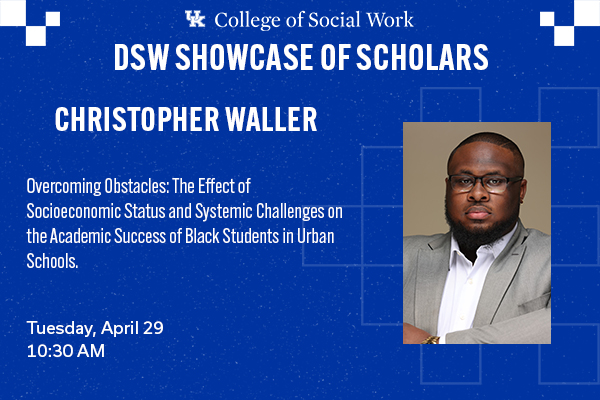DSW Candidate – Christopher Waller, 10:30 AM – 11:45 AM
$0.00
Virtual Showcase of DSW Scholars 2025 Event!
Overcoming Obstacles: The Effect of Socioeconomic Status and Systemic Challenges on the Academic Success of Black Students in Urban Schools
DSW Candidate – Christopher Waller, mSW
Tuesday, April 29, 2025
10:30 AM- 11:45 AM Eastern Time Zone
Credit Hours: This session is not eligible for CE credit
Description
Overcoming Obstacles: The Effect of Socioeconomic Status and Systemic Challenges on the Academic Success of Black Students in Urban Schools
This presentation examines the challenges faced by Black students in low-income urban areas, specifically focusing on the impact of socioeconomic status (SES) and systemic inequities on their educational experiences. Employing a mixed-methods approach, the study investigates how economic disparities and systemic racism influence Black students’ academic performance and sense of belonging. Key findings indicate that SES is critical in determining access to quality educational resources, often resulting in underfunded and overcrowded schools that exacerbate the achievement gap.
The presentation will also examine critical race theory (CRT), highlighting the barriers Black students face due to systemic inequalities linked to race and SES. Considering these challenges, the presentation explores developing a workshop program to enhance the cultural competence of school staff. This initiative will integrate trauma-informed care and culturally responsive teaching, fostering supportive and inclusive learning environments that recognize and leverage Black cultural capital.
The proposed initiative seeks to mitigate the adverse effects of discriminatory disciplinary practices and promote academic success by addressing Black students’ psychological and cultural needs. The presentation will highlight the findings of the necessity of implementing comprehensive and culturally responsive interventions within educational settings.
The presentation explores crucial initiatives to dismantle systemic barriers and improve Black students’ academic experiences and achievements in low-income urban schools. By investing in educators’ cultural competence, this study advocates systemic change that prioritizes equity and inclusivity.
Learning Objectives:
Upon completion of this conference, participants will be able to:
- Identify how socioeconomic factors affect the accessibility and quality of educational resources available to Black students in economically disadvantaged urban areas.
- Analyze the effects of systemic racism and inequality on Black students’ educational experiences and academic achievements, focusing on the ongoing challenges they face.
- Assess how Critical Race Theory (CRT) can be leveraged to deepen the understanding of systemic disparities encountered by Black students because of racial and economic factors.
Delivery Method: Live Interactive Training via Zoom Video Conferencing
Credit Hours: This session is not eligible for CE credit
Target Audience: This conference is intended for social workers and students.
Accreditation: University of Kentucky College of Social Work, Provider # 1377, is approved as an ACE provider to offer social work continuing education by the Association of Social Work Boards (ASWB) Approved Continuing Education (ACE) program. Regulatory boards are the final authority on courses accepted for continuing education credit. ACE provider approval period: 9/29/22-9/29/25. Social workers participating in this conference will receive up to 15 general continuing education credits.
Claiming CE Credit: Instructions for claiming CE credit will be disseminated at the beginning of each session.
Questions: If you have any questions regarding CE credit or to report a grievance, please contact Christina Krantz at Christina.Krantz@uky.edu. For technical assistance, please contact lmshelp@uky.edu.
Disclaimer: The views and opinions expressed in these presentations are those of the individual presenters and do not necessarily reflect the official policies or positions of the University of Kentucky or the College of Social Work. The inclusion of any topics, perspectives, or discussions is intended for academic engagement and does not constitute endorsement by the institution.
